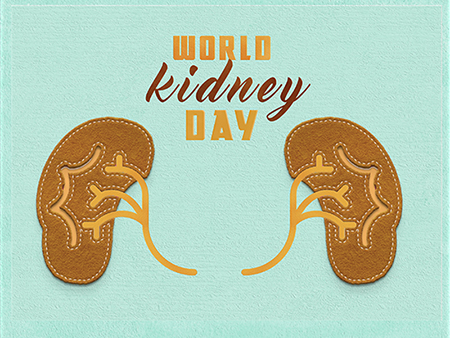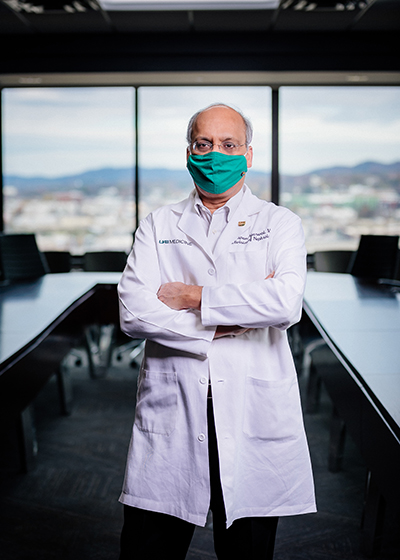Media contact: Bob Shepard
 The prevalence of kidney disease in Alabama is extensive. Of the 37 million Americans living with kidney disease, a significant number of those people live in Alabama. World Kidney Day, observed annually on the second Thursday in March, campaigns for kidney health across the globe.
The prevalence of kidney disease in Alabama is extensive. Of the 37 million Americans living with kidney disease, a significant number of those people live in Alabama. World Kidney Day, observed annually on the second Thursday in March, campaigns for kidney health across the globe.
“Regionally, the high incidence of kidney disease in the Southeast is a major complication of other diseases such as hypertension, obesity and diabetes,” said Anupam Agarwal, M.D., executive vice dean in the University of Alabama at Birmingham School of Medicine and director of the Division of Nephrology, who has been a practicing kidney physician and researcher for more than 30 years.
Heat maps for diabetes, obesity, stroke and kidney disease show that chronic diseases appear in the same areas. Agarwal says Alabama is always a hot spot for these chronic conditions.
A compounding crisis
Agarwal explains that kidney complications can be of significant magnitude since the kidney is closely linked to multiple organ systems.
“More importantly, Black/African Americans, Latinx and Hispanic communities, and other underrepresented minorities have a much higher predisposition to kidney disease,” he said.
“This disparity could be related to genetic factors, specifically a gene called ApoL1 — a component of high-density lipoprotein that transports cholesterol and certain fats through the bloodstream from the body’s tissues to the liver. Mutations in the ApoL-1 gene render Black/African Americans more susceptible to kidney disease.”
Plus, with increased incidences of high blood pressure and other underlying conditions, the chances of kidney disease are much higher in communities of color.
In the same way, Agarwal says, social determinants of health deeply contribute to the kidney disease burden in Alabama, an issue that has been publicly exposed by the COVID-19 pandemic.
“Diet and salt intake, access to health care, and access to exercise make a huge difference in kidney health,” he said. “We still see patients who show up in the emergency room who have never had their blood pressure checked and have never seen a doctor in their entire lives due to mistrust in medicine and/or lack of access to health care. They have end-stage kidney disease needing emergent dialysis and ultimately a transplant.”
COVID meets a preexisting epidemic
Multiple studies in the United States and Europe have noted high increases in acute kidney injury during the COVID-19 pandemic.
A study of 4,000 participants by Mount Sinai, published in September 2020, describes troubling consequences of COVID-19 on the kidneys, including acute kidney injury, which occurred in 46 percent of hospitalized patients, one-fifth of whom required dialysis.
Even after hospitalization, many people suffer long-term kidney complications from COVID-19. In a recent study of more than 5,000 U.S. veterans hospitalized with COVID-19, 32 percent had acute kidney injury. Of significant concern was the fact that 47 percent did not recover to baseline kidney function by discharge, highlighting that chronic kidney disease is an important post-acute consequence of COVID-19.
“The virus enters a cell through a protein called ACE2, and the kidney has a very high content of the ACE2 protein,” Agarwal said. “The outcomes for otherwise healthy people and the impact on the kidney is still unknown. Studies are ongoing, and more needs to be done.”
People with existing kidney disease are at a higher risk of long-term complications from COVID-19.
“Those on dialysis and who have received kidney transplants can get very sick,” he said. “While the burden of kidney disease in Alabama was already high, the COVID-19 pandemic adds an additional obstacle for those living with kidney disease, as well as their treating physicians.”
 Anupam Agarwal, M.D. (Photography: Andrea Mabry)Cutting-edge research at UAB
Anupam Agarwal, M.D. (Photography: Andrea Mabry)Cutting-edge research at UAB
Agarwal has also dedicated a portion of his professional work to training the next generation of nephrologists, as well as to finding new therapies and discoveries on kidney disease in his laboratory.
“The collaboration at UAB is like nowhere else in the country,” he said. “We take a bedside to bench and back to bedside approach with our research. This method propels findings and creates momentum in discoveries.”
At the O’Brien Center for Acute Kidney Injury Research, funded as one of eight National Institutes of Health Centers in the country, Agarwal’s laboratory is currently studying a specific protein, heme oxygenase-1, and learning how to exploit this protein to protect against acute kidney injury and kidney disease.
“It turns out that this protein may also have a protective effect against COVID-19 in the kidney,” he said.
“Living Well with Kidney Disease”
Agarwal says this year’s World Kidney Day and Kidney Health Awareness Month are more important than ever due to the major complications presented by COVID-19 in kidney patients.
“It’s a time to be reminded of preventive measures,” he said. “World Kidney Day aims to provide education on kidney health and resources for those impacted by kidney disease.”
He says one reason so many people have undetected kidney disease is that it does not cause any pain during early stages of the disease. Kidney disease is found through blood work, having blood pressure levels checked and urine tests.
“Staying up-to-date on annual physicals is a great way to stay protected,” he said.
Agarwal also says that kidneys can be protected by eating a well-balanced diet, aiming for a healthy weight, managing blood pressure, reducing stress and exercising. For those living with diabetes, having blood glucose maintained with treatment can help prevent kidney disease.
Additionally, following CDC guidelines is critical to maintaining kidney health during the pandemic. Simple guidelines like washing hands, wearing a mask and social distancing can help prevent COVID-19 infection, which ultimately protects the kidneys.
